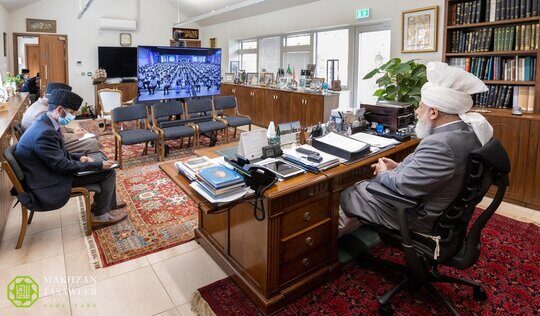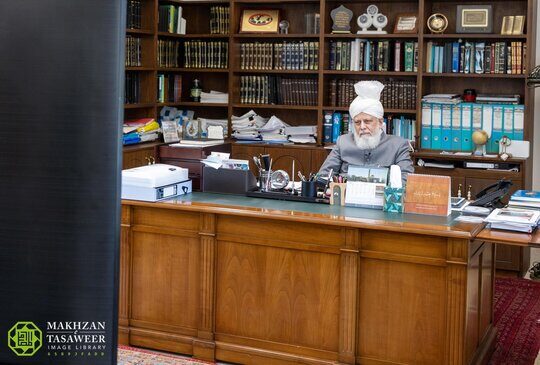On 28 August 2021, members of Atfal-ul-Ahmadiyya Germany were given the opportunity to meet with Hazrat Khalifatul Masih Vaa in a virtual meeting.
The meeting commenced with a recitation of the Holy Quran and its Urdu and German translations. Following this, a poem [nazm] was also recited. After the tifl had recited the poem, Hazrat Amirul Momineenaa addressed the young tifl and asked how old he was, to which the tifl replied that he was 12. Huzooraa said, “Masha-Allah, however much you recited, you recited it very well.” Hearing these words of encouragement from Huzooraa, the young tifl smiled and became overwhelmed with joy.
Hazrat Khalifatul Masih Vaa, alluding to the previous meeting that took place last week and where it had started to rain, said, “I see, today, you have seated them in a hall, after experiencing what had happened with the khuddam when it rained. By the way, masha-Allah, these [young boys] are also mujahids [very resilient].” Huzooraa added that nowadays, he was delivering sermons on the companions that fought in the Battle of Badr. Huzooraa said that there were even 13- and 14-year-old boys “who kept fighting and remained steadfast […] So, our atfal are also, masha-Allah, mujahids,” Huzooraa then smiled and added, “but it is good you have seated them indoors”.
Hazrat Khalifatul Masih Vaa then asked Sadr Majlis Khuddam-ul-Ahmadiyya Germany how many atfal were seated in the hall, to which Sadr Sahib responded that 1,040 atfal were seated there. Seeing that the atfal were adhering to social distancing measures, Huzooraa said, “You have done a good job. Social distancing must be exercised. We should be careful.”

Next, the atfal had the opportunity to ask questions and seek guidance on various matters.
The first question asked was with regard to the coronavirus vaccine. A young tifl stated that children aged 12 years and over had been invited by the [German] health authorities to have their vaccination. He said some were of the opinion that they should get vaccinated whilst others were against it. He asked Huzooraa what he thought about this.
Hazrat Khalifatul Masih Vaa said that being vaccinated was a good thing as it protected against the virus. Huzooraa added that he had had some research conducted by various Ahmadi specialists in this field. All of those specialists agreed that there was no issue with being vaccinated.
Next, a tifl asked Hazrat Amirul Momineenaa if one would be required to observe Salat in heaven.
Huzooraa said:
“Allah the Exalted will reward you with Paradise for the good deeds that you perform here [in this world] […] You will continuously remember Allah in Paradise [through zikr]. However, Allah knows best what kind of zikr He will require you to do in Paradise. The five daily prayers in the current form are for this life. Allah knows best in what way and form He would like us to remember Him in the next life. […] Offer your five daily prayers fervently here [in this world]; it is then that you will be rewarded with Heaven […]”
A tifl asked Hazrat Amirul Momineenaa how he selected names for newborn babies.
Huzooraa said:
“When Allah entrusted me with the responsibility of Khilafat, I saw that Khalifatul Masih IVrh had made a file that contained names for children. Names would then be selected from it and given to newborn babies. Hence, I also continued this practice and added more names and updated the file with more names that came to mind […] Attempts are made to have the name [of the newborn] similar to the names of the parents, but sometimes other names are also given.”
Hazrat Amirul Momineenaa then asked the tifl, named Jazib, who had named him, to which he responded that his name was given by Hazrat Amirul Momineenaa. Huzooraa said, “Become ‘jazib’ [one who absorbs]! […] Absorb the love of Allah, absorb the love of Allah’s Messengersa, and do good deeds. Only then will you understand the true meaning of your name.”
Following this, a tifl asked Huzooraa if one’s name had an effect on one’s character.
Hazrat Khalifatul Masih Vaa said:
“Good names should be [given to newborns]. [A child] should not be named after an idol or evil people. It is best to be named after one of the attributes of Allah the Almighty, or after pious elders. There are certain names that should not be used, such as Yazid – nowadays the month of Muharram is passing – […] the Promised Messiahas [when referring to Yazid] would say ‘Yazid, paleed’ [the wicked and impure] who caused the martyrdom of our Hazrat Imam Hussainra […]”.
Huzooraa reiterated that names given to newborn babies should be good names and should be after pious, noble people, or after the attributes of Allah.
Upon being asked about the creation of mankind and our purpose of worshipping Allah, Hazrat Khalifatul Masih Vaa said that humans were created with many qualities, and were known as a “social animals”. God gave humans wisdom, a brain, through which they were able to invent new and remarkable things such as planes, cars, computers, phones, apps, etc. So, Huzooraa said, when God had created humans with all these faculties, we should also express our gratitude towards Him. And thus, the method of expressing our gratitude is through worship.
A young tifl asked Huzooraa about his view on UFOs and aliens.
Huzooraa said that so far, only movies had been made on aliens and that no such aliens had come to this world as of yet. He further said, “At some point, when mankind comes in contact with another planet and with the creation that possibly inhabits it, then we’ll see. At the moment, [such aliens] are only seen in fiction, novels and movies […]”
Next, a tifl asked how one benefited from giving charity [sadaqah].
Hazrat Khalifatul Masih Vaa said:
“If you give sadaqah, at least others benefit from it, right? Shouldn’t we think about the benefit of others?”
To this, the tifl responded in the affirmative.
Huzooraa added that when a person helped another, then Allah helped them and was happy with them. When one helps a person who is less fortunate, Huzooraa said, “Your heart will also find peace” for helping a person who is less fortunate.
Whilst mentioning Hazrat Sahibzada Abdul Latifra and the Promised Messiah’sas statement about Kabul, “O land of Kabul! You are a witness to the heinous crime committed on your soil. O miserable land! You have, in the sight of Allah, been condemned as you are the scene of this most atrocious crime”, a tifl asked if this state would persist.
Hazrat Khalifatul Masih Vaa said:
“Only Allah knows [of the future]. This is what we see nowadays. Moreover, the whole nation has been suffering since that incident. The incident [of martyrdom] took place in the land of Kabul, but the area of Kabul as well as the area where Sahibzada Abdul Latifra Shaheed was from, is in relentlessness and is experiencing a lack of peace. Furthermore, unrest and a lack of peace are prevalent throughout Afghanistan […] This will continue until the majority [of the country] changes its condition or at least expresses its hatred for the evils [prevalent in the country].”
A tifl asked how one could know when one was undergoing a difficult situation in life, if it was a trial or punishment from Allah. Answering, Hazrat Amirul Momineenaa said:
“If you have done something bad and are in trouble because of it, then it is clear that it is a punishment. If a person has not done anything wrong and some difficulties have arisen, then it means that it is a trial from Allah.” Huzooraa said the Prophets, who were Allah’s beloved, also faced difficulties. “The Holy Prophetsa, who was the dearest to Allah, also faced hardships”.
Thus, Huzooraa said that when man, during hardships, submitted to the will of God, then he was rewarded in abundance.
A very young tifl asked Huzooraa how one sleeps. Huzooraa smiled and said, “You close your eyes and fall asleep when you feel sleepy.” Hearing this, all atfal in the hall began to laugh.
Hazrat Amirul Momineenaa said that God Almighty made night for man to rest and recover [Surah Yunus, Ch.10: V.68]. Humans use the night to rest their minds through sleep.
A young tifl, who aspires to be a police officer, asked Hazrat Amirul Momineenaa if Allah would punish him if, in the line of duty, he had to shoot someone.

Answering, Huzooraa said:
“If you become a policeman, and a criminal who has done something wrong, or who is on the run after killing or robbing people, confronts you and fires at you, and you fire back and he consequently dies, then there is no sin upon you. That was a confrontation during which he died. However, you should try to catch him, instead of killing him”.
A tifl asked Huzooraa what his favourite dish was when he was younger. Hazrat Amirul Momineenaa replied, “I never made a fuss like children usually do nowadays. Whatever was cooked at home, we ate. If daal was cooked, we would eat daal. If meat was cooked, we would eat meat”.
A tifl asked Hazrat Amirul Momineenaa how he should respond to a friend or a person who talked to him in a bad manner. Huzooraa said that first and foremost, one should befriend those who are good. However, if one heard evil things being said, one should stand up and leave that place and only come back when such discussion was over [Surah al-Nisa, Ch.4, V.141]. “Tell them,” Huzooraa said, “I don’t hate you; I hate the bad things that are being discussed”.
Upon being asked how a tifl could become a waqif-e-nau, Huzooraa said:
“Now that you have grown up, you cannot be a waqif-e-nau. A waqif-e-nau is a person who is dedicated to the scheme of Waqf-e-Nau before they are born […] If you desire to serve religion, then you should present yourself for waqf. If you want to become a missionary, then you may go to Jamia and dedicate your life. If you wish to become a doctor, then become a doctor and dedicate your life to serve in one of the Jamaat’s hospitals”.
The last question asked was about anger. A young tifl asked what a person should do when one became angry.
Hazrat Amirul Momineenaa said:
“When one becomes angry, it is said in a hadith to drink cold water so that the anger may subside, and to sit down”. [Sunan Abi Dawud, Kitab al-Adab]
In the end, Huzooraa addressed Sadr Sahib and said, “May Allah help you train the Atfal-ul-Ahmadiyya and Khuddam-ul-Ahmadiyya”.
In the end, Huzooraa conveyed his salaam and the meeting came to a close.
(Report prepared by Al Hakam)

